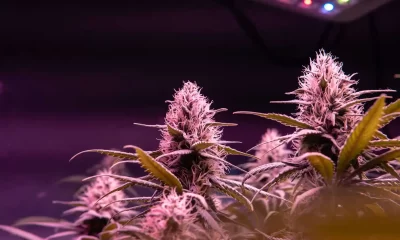Business
Bill Gates Confesses to Seth Rogen He Smoked Weed in High School ‘To Be Cool’

The multi-billionaire also has some strong opinions on (strong) edibles.
Microsoft founder Bill Gates shared with actor and acclaimed stoner Seth Rogen that he, too, has a history with cannabis (although we can assume Gate’s tolerance is much lower than Rogen’s). Gates appeared on an episode of Rogen’s new podcast Unconfuse Me, which was released last week. Rogen and his wife, Lauren Miller, talked all things cannabis with the billionaire and philanthropist, such as research barriers, cannabis potency, and Gates’ attempts to be a popular kid.
Although considering the tech pioneer is worth $117.6 billion, it’s safe to say it was advantageous for him to embrace his true nerd form.
Gates said that in high school, he said yass to puff puff pass, confessing that he smoked weed “to be cool.”
“It wasn’t so much smoking pot for pot’s sake as it was being part of the crowd,” Gates said. Gates elaborated, sharing that while his high school indulgence was to fit in, he’s very much on board with the changes in cannabis policy. “It’s amazing how it’s changed. You know, when I grew up, it was just kind of a rebellion thing.”
He added that the continuing division between state and federal law has “got to be resolved.”
“When it first came up in what Colorado [and] Washington State—you know, so my state was one of the first to have that—I thought, ‘wow, things really are changing,’” Gates, who was born in Seattle, said. “And the fact that you can have the federal level still have one set of rules and the state rules, there’s definitely a paradox there that got to be resolved at some point.”
The conversation shifted to edibles, which, while beloved by so many in the cannabis community, are too strong for Gates’ liking. Like so many older men before him, the multi-billionaire shared concern that weed has gotten much stronger since his high school days. “A lot of us who were smoking when it was illegal, the dosage was actually pretty modest,” Gates said.“So at least as you move into this legal pot world, you can be getting like really extreme doses, particularly on the edibles,” he said. “I mean, I think I know, ‘okay, if I puff five times’ what that means, whereas if you ingest I have no clue.”
Hey, there, Gates. Some of us don’t have heaps of billions of dollars and need 100mg of THC infused into the comfort of a gummy, so don’t be hating.
Of course, everyone’s tolerance is different, and edibles should be appropriately labeled, so whether you want something low-dose or the I’ve-been-a-medical-patient-for-ten-years dose, you know what you’re getting. Even Rogen, who owns the cannabis lifestyle company Houseplant, agreed that edibles can be a (literal) trip. Rogen continued to say that this is an area where he’d appreciate federal regulations to standardize product potency safely. According to Rogen, even cannabis legends like Snoop Dogg “doesn’t eat edibles.”
“That’s how wild the variation on edibles is,” Rogen said. “You really don’t know what you’re gonna get.” Earlier this year, on his GGN with Snoop Dogg show, Snoop did tell Rogen that “I don’t like edibles because they don’t have an on and off button.” However, if you’re someone who could eat a bowl of edibles for breakfast, don’t feel weird. It’s rumored that Snoop Dogg’s professional joint roller makes him up to 150 a day, and the legendary rapper does have his own edible line, including cannabis-infused onion rings.
Finally, Gates, while supporting cannabis deregulation, also expressed concern regarding carcinogenic effects if “you smoke enough weed.” Standing by his intake method of choice, Rogen said there was no scientific consensus on that and that he and his wife’s doctors haven’t told them to stop enjoying smoke sessions.
Business
New Mexico cannabis operator fined, loses license for alleged BioTrack fraud

New Mexico regulators fined a cannabis operator nearly $300,000 and revoked its license after the company allegedly created fake reports in the state’s traceability software.
The New Mexico Cannabis Control Division (CCD) accused marijuana manufacturer and retailer Golden Roots of 11 violations, according to Albuquerque Business First.
Golden Roots operates the The Cannabis Revolution Dispensary.
The majority of the violations are related to the Albuquerque company’s improper use of BioTrack, which has been New Mexico’s track-and-trace vendor since 2015.
The CCD alleges Golden Roots reported marijuana production only two months after it had received its vertically integrated license, according to Albuquerque Business First.
Because cannabis takes longer than two months to be cultivated, the CCD was suspicious of the report.
After inspecting the company’s premises, the CCD alleged Golden Roots reported cultivation, transportation and sales in BioTrack but wasn’t able to provide officers who inspected the site evidence that the operator was cultivating cannabis.
In April, the CCD revoked Golden Roots’ license and issued a $10,000 fine, according to the news outlet.
The company requested a hearing, which the regulator scheduled for Sept. 1.
At the hearing, the CCD testified that the company’s dried-cannabis weights in BioTrack were suspicious because they didn’t seem to accurately reflect how much weight marijuana loses as it dries.
Company employees also poorly accounted for why they were making adjustments in the system of up to 24 pounds of cannabis, making comments such as “bad” or “mistake” in the software, Albuquerque Business First reported.
Golden Roots was fined $298,972.05 – the amount regulators allege the company made selling products that weren’t properly accounted for in BioTrack.
The CCD has been cracking down on cannabis operators accused of selling products procured from out-of-state or not grown legally:
- Regulators alleged in August that Albuquerque dispensary Sawmill Sweet Leaf sold out-of-state products and didn’t have a license for extraction.
- Paradise Exotics Distro lost its license in July after regulators alleged the company sold products made in California.
Golden Roots was the first alleged rulebreaker in New Mexico to be asked to pay a large fine.
Source: https://mjbizdaily.com/new-mexico-cannabis-operator-fined-loses-license-for-alleged-biotrack-fraud/
Business
Marijuana companies suing US attorney general in federal prohibition challenge

Four marijuana companies, including a multistate operator, have filed a lawsuit against U.S. Attorney General Merrick Garland in which they allege the federal MJ prohibition under the Controlled Substances Act is no longer constitutional.
According to the complaint, filed Thursday in U.S. District Court in Massachusetts, retailer Canna Provisions, Treevit delivery service CEO Gyasi Sellers, cultivator Wiseacre Farm and MSO Verano Holdings Corp. are all harmed by “the federal government’s unconstitutional ban on cultivating, manufacturing, distributing, or possessing intrastate marijuana.”
Verano is headquartered in Chicago but has operations in Massachusetts; the other three operators are based in Massachusetts.
The lawsuit seeks a ruling that the “Controlled Substances Act is unconstitutional as applied to the intrastate cultivation, manufacture, possession, and distribution of marijuana pursuant to state law.”
The companies want the case to go before the U.S. Supreme Court.
They hired prominent law firm Boies Schiller Flexner to represent them.
The New York-based firm’s principal is David Boies, whose former clients include Microsoft, former presidential candidate Al Gore and Elizabeth Holmes’ disgraced startup Theranos.
Similar challenges to the federal Controlled Substances Act (CSA) have failed.
One such challenge led to a landmark Supreme Court decision in 2005.
In Gonzalez vs. Raich, the highest court in the United States ruled in a 6-3 decision that the commerce clause of the U.S. Constitution gave Congress the power to outlaw marijuana federally, even though state laws allow the cultivation and sale of cannabis.
In the 18 years since that ruling, 23 states and the District of Columbia have legalized adult-use marijuana and the federal government has allowed a multibillion-dollar cannabis industry to thrive.
Since both Congress and the U.S. Department of Justice, currently headed by Garland, have declined to intervene in state-licensed marijuana markets, the key facts that led to the Supreme Court’s 2005 ruling “no longer apply,” Boies said in a statement Thursday.
“The Supreme Court has since made clear that the federal government lacks the authority to regulate purely intrastate commerce,” Boies said.
“Moreover, the facts on which those precedents are based are no longer true.”
Verano President Darren Weiss said in a statement the company is “prepared to bring this case all the way to the Supreme Court in order to align federal law with how Congress has acted for years.”
While the Biden administration’s push to reschedule marijuana would help solve marijuana operators’ federal tax woes, neither rescheduling nor modest Congressional reforms such as the SAFER Banking Act “solve the fundamental issue,” Weiss added.
“The application of the CSA to lawful state-run cannabis business is an unconstitutional overreach on state sovereignty that has led to decades of harm, failed businesses, lost jobs, and unsafe working conditions.”
Business
Alabama to make another attempt Dec. 1 to award medical cannabis licenses

Alabama regulators are targeting Dec. 1 to award the first batch of medical cannabis business licenses after the agency’s first two attempts were scrapped because of scoring errors and litigation.
The first licenses will be awarded to individual cultivators, delivery providers, processors, dispensaries and state testing labs, according to the Alabama Medical Cannabis Commission (AMCC).
Then, on Dec. 12, the AMCC will award licenses for vertically integrated operations, a designation set primarily for multistate operators.
Licenses are expected to be handed out 28 days after they have been awarded, so MMJ production could begin in early January, according to the Alabama Daily News.
That means MMJ products could be available for patients around early March, an AMCC spokesperson told the media outlet.
Regulators initially awarded 21 business licenses in June, only to void them after applicants alleged inconsistencies with how the applications were scored.
Then, in August, the state awarded 24 different licenses – 19 went to June recipients – only to reverse themselves again and scratch those licenses after spurned applicants filed lawsuits.
A state judge dismissed a lawsuit filed by Chicago-based MSO Verano Holdings Corp., but another lawsuit is pending.
Source: https://mjbizdaily.com/alabama-plans-to-award-medical-cannabis-licenses-dec-1/
-

 Business2 years ago
Business2 years agoPot Odor Does Not Justify Probable Cause for Vehicle Searches, Minnesota Court Affirms
-

 Business2 years ago
Business2 years agoNew Mexico cannabis operator fined, loses license for alleged BioTrack fraud
-

 Business2 years ago
Business2 years agoAlabama to make another attempt Dec. 1 to award medical cannabis licenses
-

 Business2 years ago
Business2 years agoWashington State Pays Out $9.4 Million in Refunds Relating to Drug Convictions
-

 Business2 years ago
Business2 years agoMarijuana companies suing US attorney general in federal prohibition challenge
-

 Business2 years ago
Business2 years agoLegal Marijuana Handed A Nothing Burger From NY State
-

 Business2 years ago
Business2 years agoCan Cannabis Help Seasonal Depression
-

 Blogs2 years ago
Blogs2 years agoCannabis Art Is Flourishing On Etsy













